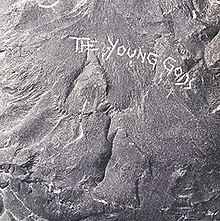
Ministry is an American industrial metal band founded in Chicago, Illinois, in 1981 by producer, singer, and instrumentalist Al Jourgensen. Originally a synth-pop outfit, Ministry evolved into one of the pioneers of industrial rock and industrial metal in the late 1980s. The band's lineup has changed frequently, leaving Jourgensen as the sole remaining original member. Musicians who have contributed to the band's studio or live activities include vocalists Nivek Ogre, Chris Connelly, Gibby Haynes, Burton C. Bell and Jello Biafra, guitarists Mike Scaccia, Tommy Victor and Cesar Soto, bassists Paul Barker, Paul Raven, Jason Christopher, Tony Campos and Paul D'Amour, drummers Jimmy DeGrasso, Bill Rieflin, Martin Atkins, Rey Washam, Max Brody, Joey Jordison and Roy Mayorga, keyboardist John Bechdel, and rappers and producers DJ Swamp and Arabian Prince.
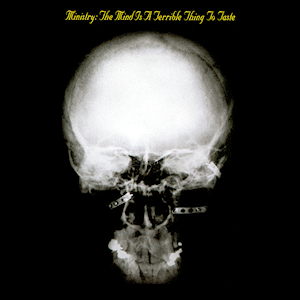
The Mind Is a Terrible Thing to Taste is the fourth studio album by American industrial metal band Ministry, released on November 14, 1989, by Sire Records. The music took a more hardcore, aggressively guitar-driven direction, with Jourgensen inspired by Stormtroopers of Death and Rigor Mortis to add thrash metal guitars to the album and subsequent Ministry releases. As with most of Ministry's work, the album's lyrics deal mainly with political corruption, cultural violence, environmental degradation, nuclear war, drug addiction, and insanity.

The Land of Rape and Honey is the third studio album by American industrial metal band Ministry, released on October 11, 1988, by Sire Records. This is the first Ministry album to include bassist Paul Barker and marks a departure from the band's previous two synthpop and EBM records. It incorporates heavy metal guitars and industrial music influences, and Al Jourgensen uses distorted vocals in his natural accent, rather than the faux British accent of previous albums. The resulting sound was influential in the industrial metal genre and is Jourgensen's favorite Ministry album. The album was certified gold by the RIAA in January 1996.
Industrial metal is the fusion of heavy metal and industrial music, typically employing repeating metal guitar riffs, sampling, synthesizer or sequencer lines, and distorted vocals. Prominent industrial metal acts include Ministry, Nine Inch Nails, Rammstein, KMFDM, and Godflesh.

The Young Gods are a Swiss industrial rock band from Fribourg, formed in 1985. The original lineup of the band featured singer Franz Treichler, sampler player Cesare Pizzi and drummer Frank Bagnoud. For most of their history, the band maintained a trio format with a singer, a sampler player and a drummer, albeit with multiple line-up changes. Treichler is the band's sole consistent member; the current line-up also features Pizzi and drummer Bernard Trontin. During their career, the band have extensively collaborated with producer Roli Mosimann.

"Today" is a song by American alternative rock band the Smashing Pumpkins, written by lead vocalist and guitarist Billy Corgan. The song, though seemingly upbeat, contains dark lyrics; Corgan wrote the song about a day in which he was having suicidal thoughts. The contrast between the grim subject matter of the song and the soft instrumental part during the verses, coupled with use of irony in the lyrics, left many listeners unaware of the song's tale of depression and desperation. The song alternates between quiet, dreamy verses and loud choruses with layered, distorted guitars.
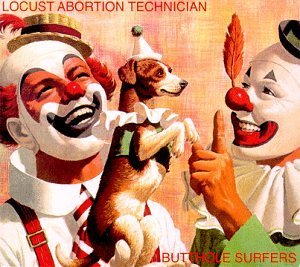
Locust Abortion Technician is the third full-length studio album by American rock band Butthole Surfers, released in March 1987. The album was originally released on both vinyl and CD on Touch and Go, and was remastered on CD on the band's label, Latino Buggerveil, in 1999.

Treponem Pal is a French industrial metal band formed in Paris in 1986. The current line-up of the band consists of Marco Neves (vocals), Polak (guitar), Didier Bréard (sampler), Mathys Dubois (drums) and Syn-Anton (bass). The band went through multiple line-up changes with Neves being the only constant member. The band is named after treponema pallidum, the bacterium that causes syphilis. The band's music was described as a mixture of "aggressive metal and a hint of industrial" similar to Godflesh and The Young Gods.

Pure is the second studio album by English industrial metal band Godflesh. It was released on 13 April 1992 through Earache Records. Though originally labeled only as industrial metal, the album has since been recognised as one of the earliest post-metal releases. Musically, Pure is rhythmically mechanical and features harsh guitars, with protracted songs and an abundance of deliberate repetition. Like much of Godflesh's music, it is regarded as particularly heavy and aggressive, and these elements helped it gain critical acclaim.

Filth is the debut studio album by American experimental rock band Swans. It was released in 1983 through Neutral Records, following the release of the band's self-titled debut EP in 1982. Though it did not receive much contemporary attention, Filth has since been recognized as ahead of its time and significant to heavy genres of music.
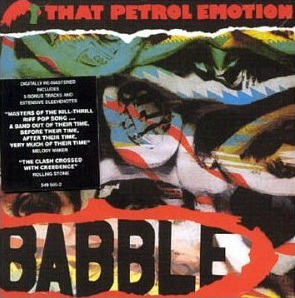
Babble is the second album by the Northern Irish band That Petrol Emotion, released in 1987. The album was re-released in 2001 and in 2010. It peaked at No. 30 in the UK. The band supported the album with a North American tour.

Young God is the second EP by the American experimental rock band Swans. Released in 1984, it was issued through the record label K.422. Although also referred to as "Raping a Slave" and "I Crawled", the band officially recognizes it as Young God. Similar to Cop, the cover art features a notice stating that the record is "designed to be played at maximum volume."

"Jesus Built My Hotrod" is a song by American industrial metal band Ministry, released as the first single from their fifth studio album, Psalm 69: The Way to Succeed and the Way to Suck Eggs. It was written by the band's frontman Al Jourgensen, bassist Paul Barker, drummer Bill Rieflin, session keyboardist Michael Balch, and guest vocalist Gibby Haynes of the Butthole Surfers, and was co-produced by Jourgensen and Barker. An industrial metal track with a polyrhythmic structure, the song also features elements of rockabilly and psychobilly, and is influenced by the Trashmen 1963 hit "Surfin' Bird", and Flannery O'Connor's novel Wise Blood.

L'eau rouge is the second album by industrial band The Young Gods, released in September 1989 by Play It Again Sam Records. It is usually referred to as their masterpiece and was included in 1001 Albums You Must Hear Before You Die in 2005.
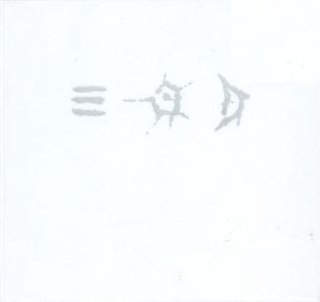
Only Heaven is the fourth album by industrial band The Young Gods. It was released in 1995 on Interscope Records.

Freak*on*ica is the fifth studio album by American rock band Girls Against Boys, released on May 18, 1998, through DGC Records. It was their first and only album for a major label. It was produced by Nick Launay.

Francisco José Conceição Leitão Treichler, better known as Franz Treichler, is a Swiss singer, songwriter, musician, composer and record producer. He is best known as the vocalist and sole consistent member of the Swiss industrial rock band The Young Gods, which he founded in 1985 with sampler player Cesare Pizzi and drummer Frank Bagnoud. Treichler was instrumental in the band's adoption of samplers as a main instrument. He released his solo debut album, Braindance in 2001.
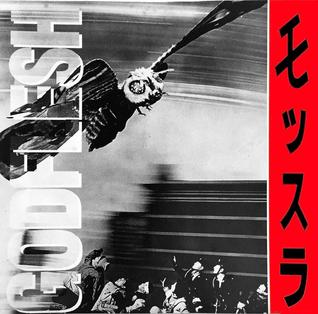
"Mothra" is a song by English industrial metal band Godflesh. It was taken from their 1992 album Pure and saw release as a radio promo and music video in the same year. The track's title is derived from 1961 Japanese film of the same name by Ishirō Honda. Musically, "Mothra" is a grinding, mechanical song with shouted vocals and heavily distorted instruments.

Aggravation is the second studio album by French industrial metal band Treponem Pal. It was released in 1991 on Roadracer Records. The record features contributions from producer Roli Mosimann and session work from the Celtic Frost drummer Stephen Priestly. The album also features a cover of Kraftwerk's 1976 track, "Radioactivity."

Excess & Overdrive is the third studio album by French industrial metal band Treponem Pal, released in 1993 on Roadrunner Records. The record was produced by The Young Gods singer Franz Treichler, with whom the band previously worked with on their 1989 debut. The track "Pushing You Too Far" was released as the album's lead single in 1993.
